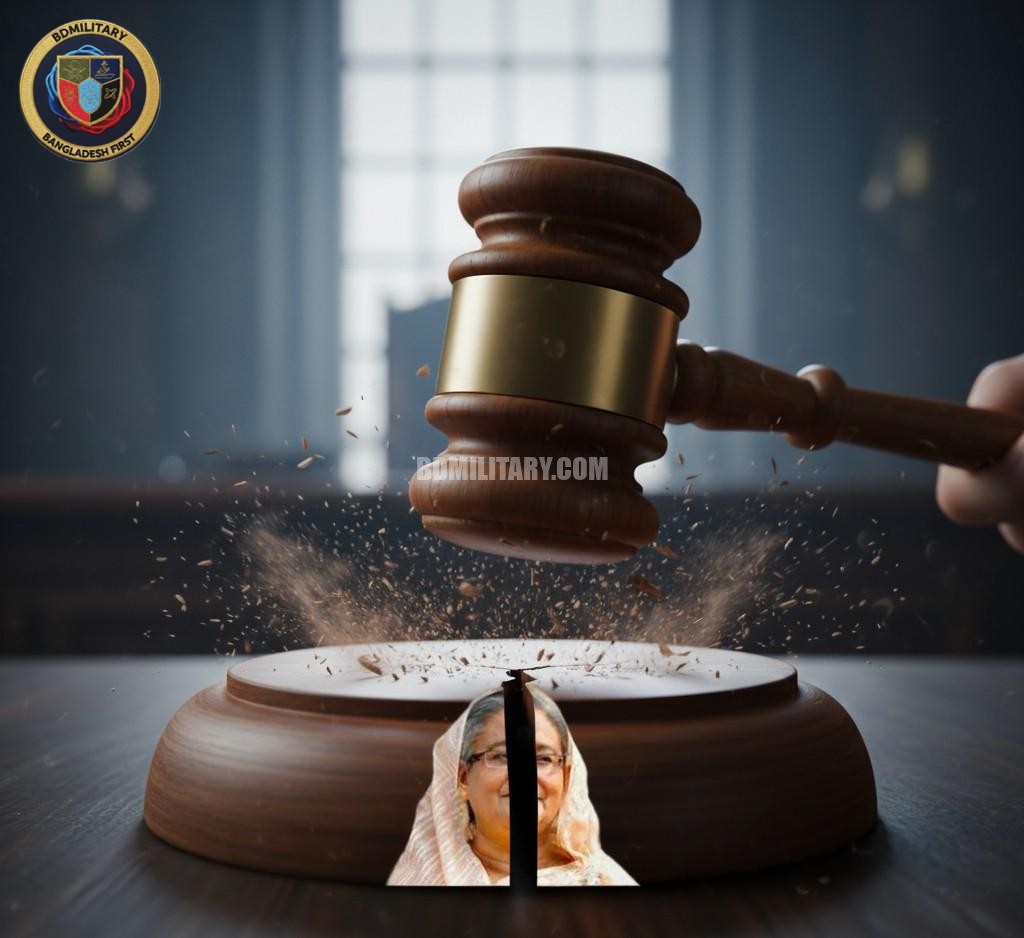Bangladesh’s International Crimes Tribunal (ICT) has delivered one of the most significant judicial decisions in the nation’s contemporary history, sentencing former Prime Minister Sheikh Hasina and former Home Minister Asaduzzaman Khan Kamal to death for crimes against humanity committed during last year’s July Uprising. The ruling, pronounced by a three-member panel led by Justice Golam Mortuza Mazumder, marks the first instance in Bangladesh where a former head of government has been convicted in absentia for contemporary crimes against civilians.
The proceedings, closely followed by both domestic and international audiences, underscore the tribunal’s insistence on accountability and the enforcement of legal norms irrespective of political stature. Bangladesh has formally requested India to immediately return the fugitive convicts under the existing bilateral repatriation mechanism, emphasising that New Delhi is treaty-bound to hand over individuals convicted of crimes against humanity.
Context of the Case
The case centres on the July–August 2024 mass uprising, during which thousands of citizens protested against systemic deficiencies in the quota system for public employment. Initially peaceful, the demonstrations were met with lethal responses by law enforcement and state-sponsored paramilitary units.
Sheikh Hasina and Asaduzzaman Khan Kamal fled to India in the wake of the uprising, while former Inspector General of Police Chowdhury Abdullah Al-Mamun appeared as a state witness. Over 28 working days, the tribunal heard testimonies from 54 of the 81 listed witnesses and examined extensive documentary, digital, and forensic evidence.
Charges and Legal Framework
The prosecution brought five charges against the accused, including incitement to kill, command responsibility for unlawful killings, abetment, and failure to prevent atrocities against civilians. Sheikh Hasina was found guilty of multiple counts, including ordering the deployment of drones, helicopters, and lethal weapons against protesters in Ashulia and Chankharpul. The tribunal noted that her statements to local officials, urging police to arrest and shoot protesters, constituted both direct and command responsibility for the resulting deaths and injuries.
For one charge, she was sentenced to imprisonment until natural death, while the remaining charges resulted in death sentences. Asaduzzaman Khan Kamal was found guilty of four counts of crimes against humanity, particularly regarding the killing of six individuals in Chankharpul, and was sentenced to death. Chowdhury Abdullah Al-Mamun, who fully disclosed relevant information as a state witness, was sentenced to five years in prison.
Evidentiary Basis of the Verdict
The ICT’s 453-page verdict relied on comprehensive evidence, including 2,018 pages of references, 4,005 pages of seized documentation, and 2,724 pages listing victims of the July Uprising. Witness testimonies corroborated the use of lethal force by law enforcement, arbitrary arrests, and systemic intimidation of protestors. Digital communications and operational directives confirmed that high-level decisions were made to suppress dissent with excessive force.
Forensic evidence from autopsies and medical examinations substantiated claims of unlawful killings and injuries sustained during state-led crackdowns. The tribunal highlighted statements by Sheikh Hasina, including “Chhatra League is enough to control the students,” and orders for police to “shoot protestors anywhere they can,” as clear evidence of intent and knowledge of the atrocities.
Command Responsibility and Legal Reasoning
A key element of the verdict was the application of the principle of command responsibility, holding leaders criminally liable for both acts they order and failures to prevent or punish subordinates when aware of their actions. Sheikh Hasina, as prime minister, exercised effective control over police, intelligence, and paramilitary units implicated in the violence. Asaduzzaman Khan Kamal, as home minister, supervised agencies involved in law enforcement and public security.
The court concluded that omissions and failures to intervene constituted substantive grounds for convictions. The repeated deployment of state instruments against civilians, combined with direct incitement and the lack of punitive measures, satisfied the threshold for crimes against humanity under both domestic law and international legal standards.
Sentences, Implementation, and Extradition Requirement
Sheikh Hasina received multiple sentences, including death for the most severe charges and imprisonment until natural death for another. Asaduzzaman Khan Kamal was sentenced to death on all counts. Chowdhury Abdullah Al-Mamun received a five-year prison term in consideration of his cooperation as a state witness.
The tribunal ordered the seizure and attachment of all properties belonging to Sheikh Hasina and Asaduzzaman Khan Kamal within Bangladesh, ensuring assets potentially linked to the commission of these crimes are brought under state control. Compensation was also ordered for families of victims and those injured during the July–August 2024 uprising.
Bangladesh has formally requested India to repatriate the fugitives immediately, citing the existing bilateral extradition agreement as a binding legal framework. The Foreign Ministry stressed that sheltering individuals convicted of crimes against humanity would be considered an unfriendly act and a violation of justice. Attorney General Md Asaduzzaman clarified that the death sentences will take effect only once the convicts surrender in Bangladesh and may appeal within thirty days. As long as the accused remain fugitives in India, they have no legal right to appeal the sentences.
Government and Public Response
The interim government described the verdict as “historic” and urged citizens to maintain calm and restraint following the announcement. Officials emphasised that the judgement reaffirms Bangladesh’s commitment to justice and the rule of law, while underscoring the obligation of India to return the fugitives under the bilateral repatriation framework.
Victims’ families present at the tribunal expressed relief and satisfaction but raised concerns regarding the enforceability of the sentences given that the convicts remain abroad. Many emphasised the urgency of bringing them back to Bangladesh to ensure justice. Statements by bereaved parents highlighted both the closure provided by the verdict and lingering anxiety about practical enforcement.
Judicial Process and Procedural Details
The proceedings involved meticulous documentation, detailed testimony, and thorough cross-examination. The prosecution presented its closing arguments over five consecutive days, after which Chief Prosecutor Mohammad Tajul Islam requested the death penalty for Sheikh Hasina and Asaduzzaman Khan Kamal while leaving the court to decide the sentence for approver Abdullah Al-Mamun.
The 453-page verdict covers six parts and includes observations on jurisdiction, evidence assessment, and sentencing rationale. The tribunal explicitly rejected challenges to its authority and affirmed that all procedural safeguards were observed, reinforcing the legitimacy of the outcome.
Security Measures During Verdict Announcement
Given the high-profile nature of the case, authorities implemented stringent, multi-layered security arrangements around the tribunal premises. Large contingents were deployed in Dhaka to prevent unrest and maintain public order. The judgement was broadcast live on Bangladesh Television, displayed on large screens at multiple locations under the Cultural Ministry’s initiative, and streamed on the tribunal’s Facebook page, ensuring transparency and accessibility.
Implications for Rule of Law and Governance
The ICT verdict has profound implications for governance, civil-military relations, and the exercise of executive power. By holding a former prime minister and home minister accountable, the tribunal underscores that executive authority is not immune from judicial scrutiny.
For security and law enforcement agencies, the decision serves as a warning regarding operational compliance, adherence to human rights norms, and the necessity of lawful command protocols. Civil society and oversight institutions are likely to see the ruling as reinforcing transparency and legal accountability. The verdict also establishes Bangladesh’s entitlement to repatriate convicts under international law and bilateral treaties, strengthening the state’s ability to enforce justice.
Concluding Remarks
The International Crimes Tribunal’s verdict against Sheikh Hasina and Asaduzzaman Khan Kamal represents a historic milestone for Bangladesh. By meticulously documenting crimes against humanity, applying the principles of command responsibility, and ensuring due legal process, the tribunal has delivered a ruling that will resonate across legal, institutional, and political spheres for years.
While questions remain regarding the enforcement of sentences against fugitives residing abroad, Bangladesh has formally invoked its treaty rights, calling on India to repatriate the convicts. The judgement establishes that no individual, regardless of political stature, is above the law when it comes to systematic violations of citizens’ rights. Families of victims may find closure, and the broader public is reminded of the enduring importance of the rule of law in preserving justice and societal order. The ICT’s ruling will continue to shape Bangladesh’s legal landscape, reinforce institutional integrity, and inform the governance of future administrations.


